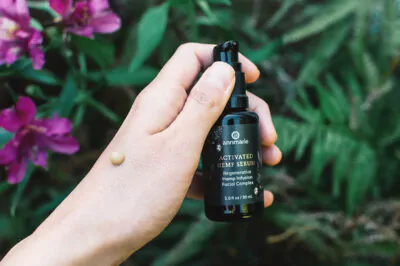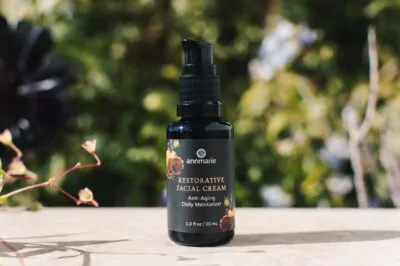Table of Contents[Hide][Show]
Have you heard about vitamin C? Word on the streets is how great it is for skin care, and we have to agree. Even though vitamin C is a vital nutrient all our bodies need, for effective skin care, applying it topically provides the best results. If you look closely at the various vitamin C products being sold in the skin care industry, you’ll actually notice there are many different types of vitamin C forms in skin care, including:
- Tetrahexyldecyl ascorbate
- L-Ascorbic acid
- Sodium Ascorbyl Phosphate
- Magnesium Ascorbyl Phosphate
- Ascorbyl Glucoside
- Ascorbyl Palmitate
- Ascorbic Acid Polypeptide
Even though there are various forms of vitamin C, not all of them work for every skin type. If you’re unsure what your skin type is, check out our detailed guide on how to determine your skin type!
It’s important to choose the most stable and effective form of vitamin C that’s also gentle on your skin. That’s why we love to use tetrahexyldecyl ascorbate (THDA) to get the best of vitamin C’s benefits for our skin. This form of vitamin C is gentle and works great for all skin types. It’s also stable, so you don’t have to worry about using a vitamin C that isn’t activated or will lose efficacy; you can rest assured knowing that it will provide the benefits you’re looking for.
What is the role of vitamin C?

When you consume vitamin C orally, it plays a crucial role in your body’s rejuvenation process. Your body needs vitamin C as a nutrient to help the natural formation of blood vessels, muscles, cartilage and collagen in your bones. When it comes to using vitamin C topically, it is excellent for providing anti-aging benefits and protecting your skin against environmental stressors. One of the best ways to introduce vitamin C into your skin is by using a vitamin C serum. A serum is an aqueous-based product that delivers hydration and potent ingredients deep into the skin because of its smaller molecular size.
By using vitamin C in a serum for skin care consistently, you will see the results of a brighter, more radiant complexion. This vitamin also aids in lessening the appearance of fine lines and wrinkles, which makes it a wonderful staple in any anti-aging routine. These benefits will vary with each serum depending on the quality of the product and the type of vitamin C used. Thus, it’s better to ensure you’ve chosen the best serum for your skin type with ones made using consciously sourced organic ingredients.
Which form of vitamin C is best absorbed?
Tetrahexyldecyl ascorbate (THDA) is a clinically researched form of vitamin C that is potentially 50 times more potent than l-ascorbic acid. L-ascorbic acid, the market’s most known vitamin C form, is not as stable as THDA. THDA is also more gentle on the skin and is oil soluble. Being oil soluble means that it can easily mix with other skin care products that are oil-based, such as facial oils. This ingredient helps to protect against the deterioration of the skin’s lipids, that can often result from environmental stressors.
When looking for skin care products to purchase that contain vitamin C, we recommend high-quality, pure serums and elixirs with THDA.
Different Types of Vitamin C In Skin Care

Consuming foods or supplements rich in vitamin C supports your immune response because it’s a potent antioxidant. When applied topically, vitamin C works to bring about a youthful complexion and protect the skin against daily stressors.
Here are different types of vitamin C in skin care commonly seen that you should know about.
Tetrahexyldecyl ascorbate (THDA)
Tetrahexyldecyl ascorbate is the most stable oil-soluble form of vitamin C. It is among the few forms of vitamin C that’s used easily within a creamy consistency. If you have sensitive skin, this form of vitamin C is a wonderful, gentle option, as it won’t further irritate your skin. THDA sinks into the skin effectively, making the best use of vitamin C’s immense benefits. It also doesn’t react to air or water, making it very stable. You can find vitamin C products featuring tetrahexyldecyl ascorbate (like our Concentrated Boosting Elixir, Brighten) made with organic and non-toxic ingredients that boost the vibrancy of your skin without the harm of harsh, unsafe, synthetic chemicals.
L-Ascorbic acid
This is the most famous form of vitamin C. It is mainly formulated at a pH of 4 or below. If your skin is very sensitive, this version of vitamin C may irritate you, so you’ll need to use a gentler option. L-ascorbic acid is water soluble, which also means it oxidizes upon exposure to air and light. Otherwise, it is relatively effective in seeping into the skin.
Sodium Ascorbyl Phosphate
Sodium ascorbyl phosphate is less potent but works as an alternative option, especially for those with sensitive skin. Once applied to the skin, sodium ascorbyl phosphate converts into l-ascorbic acid. Converting makes this form of vitamin C less active but can be gentler for those who deal with sensitivities and have less options to explore. Unlike l-ascorbic acid, sodium ascorbyl phosphate doesn’t lose its potency quickly when exposed to light and air.
Magnesium Ascorbyl Phosphate
This is among the more hydrating forms of this vitamin. You can easily add it to any water-based formulations. It may also help soothe skin and temporary redness or discomfort. This form of vitamin C gets transformed into ascorbic acid by your skin but isn’t as potent. It also doesn’t absorb well into the skin. Even though it can deliver benefits to the skin, it’s weaker compared to THDA and even l-ascorbic acid.
Ascorbyl Glucoside
Ascorbyl glucoside is a more stable and gentler form of vitamin C. Because it converts into l-ascorbic acid, it is less likely to irritate. But it can still help shield the skin from stressors and also provide a brightening effect on the skin. Ascorbyl glucoside is used mainly as a brightening ingredient in most products without the other benefits of vitamin C.
Ascorbyl Palmitate
Ascorbyl Ascorbic palmitate like other forms of vitamin C contains antioxidants that are good for the skin. However, there have also been studies indicating that it can cause harmful effects on the skin as it promotes ultraviolet-B-induced lipid peroxidation intensifying skin damage.
Ascorbic Acid Polypeptide
Ascorbic acid polypeptide is a stable form of vitamin C—great for aging skin and brightening it. Ascorbic acid polypeptide is formed through the biosynthesis of l-ascorbic acid and peptide. It’s very stable, however, it can also be irritating for sensitive skin.
Is Vitamin C Good for All Skin Types?
Vitamin C is a great skin care ingredient if you find one that’s right for your skin type and aligns with your standards of quality and purity. When choosing skin care products like serums, you need to ensure that the manufacturing process and ingredients used are truly clean and high quality in order to support your skin not only in the short term but also in the long term. If you have sensitive skin, you may find it better to use a form of vitamin C that is well-sourced and known to be gentler on the skin (such as our favorite, THDA). Check out this article to learn more about using vitamin C for sensitive skin.
Annmarie Skin Care produces beauty products that are clean, non-toxic, and made with wildcrafted ingredients, harnessing the best of nature, to bring you skin care solutions that are safe and effective. Our line of serums and elixirs contain the most stable form of vitamin C to bring you products that are both gentle on the skin and deliver the results you’re looking to achieve.
Frequently Ask Questions
Does vitamin C make your skin lighter?
Yes, one of vitamin C’s main roles in skin care is to brighten one’s complexion. It’s a great option for targeting the appearance of dark spots and dull, lackluster skin.
Does vitamin C help clear skin?
Vitamin C can help lessen the appearance of temporary redness and also offers a calming sensation. Vitamin C also replenishes the skin with moisture and helps to balance the skin’s natural oils.
How long does vitamin C stay on the skin?
Vitamin C stays on the skin and can’t be washed off once the product has been absorbed. It can stay for somewhere between 8-24 hours. We recommend patch testing before applying the product fully to the face (especially if you are trying it out for the first time) to ensure your skin responds well to the ingredients of the product.








Leave a Reply